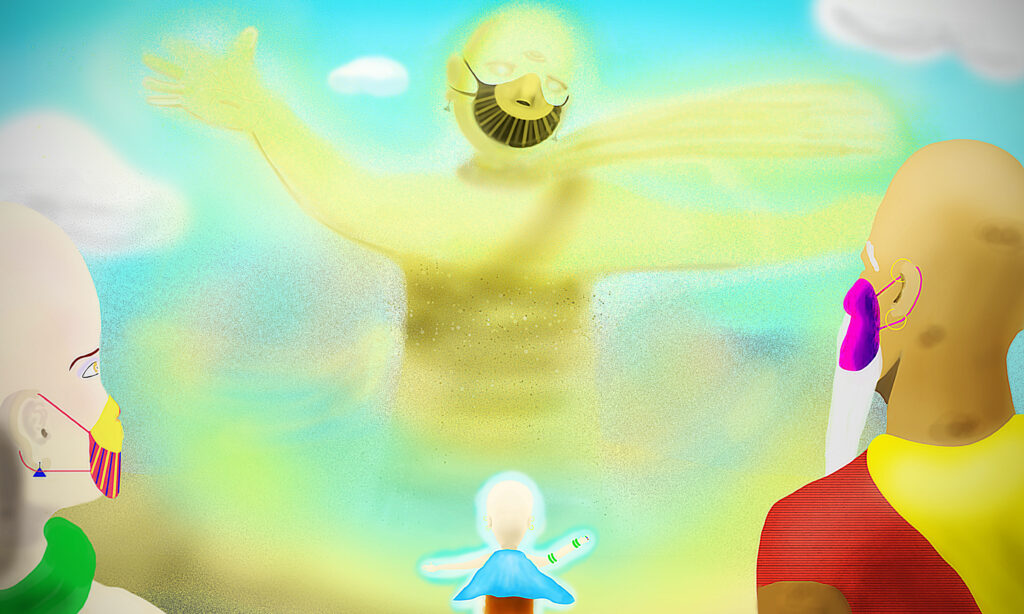
*An excerpt from the story, Two Nagí, following the characters’ decision to flee a magic prejudiced desert city called New Sūndūn.
“Storms Out of Sūndūn”
The morning we left for the caravan out of New Sūndūn, there wasn’t a cloud in the waking desert sky. No wind, either. Not even a fanning breeze from the sleepless-whistling Sūndūn Sea. It looked as clear a day as any, with the dawn melting the deep twinkle sky into pretty strands of oranges, reds, and pinks. Together, they smeared across the horizon’s outstretched canvas in a bleed, like the sky had taken two mountain fingers and smudged the colors together from one end all the way out to the other.
Waiting for our new companion, Imjí Standing Fish, to knock at the door so we could begin the long journey across the hills, I sat in my chair and kicked my legs back and forth, looking out the window towards the lumpy dunes as they began to take shape in the dawn.
“Ah,” Nagí Dey chuckled. “I hope you’re enjoying the view! Once we’re out over that last hill, it’ll be sandstorms as far as the eye can see.”
“Let’s not get ahead of ourselves,” Nagí Ūsím said, chiming in from the kitchen. “We’ve barely had time to splash our face. We haven’t even put one sandal out on the sand! For all we know the desert is feeling quite good today.”
“Hah! Since when has this desert ever felt good? I love you, but you know as well as me, this desert is the most temperamental of them all! It treats its guests like bitter exes, heh-heh-heh. And for good reason….”
“Alright,” Nagí Ūsím said, coming into the room as they patted down their face. “Your point is well taken. But let’s just wait and see. Never know what the day might bring.” Fitting their purple mask around their ears, they went around the table and helped Nagí Dey, who was only a forehead taller than me, with theirs. “Three knots, yes?”
“Yes, three knots is the best.”
“You know, I’m a little surprised. Between you and me, it’s usually you who brings the light. I’m supposed to be the one worrying about the clouds. Could it be our roles have switched?”
“Hah! Maybe you need to drink some more water, Ūsím. Me worried? You know I never worry. It’s not in the nature of an Elemental Nagí to worry. We Elemental Nagí always go with the flow. It gets hot, we accept it. It gets cold, we accept that, too. If the rain suddenly pours down and turns into snow, we open our mouths and thank U’KATZETZIM. That’s why we Elemental Nagí are never worried. We’re cool as the mountain wind and patient as the forest seed.” With their mask now tied, Nagí Dey stood up and began packing little wrapped rainbow bags into their backpack. As Nagí Dey continued to speak, something inside me felt they weren’t just talking to Nagí Ūsím, but to the shadow in their periphery, me. “You know why I don’t worry, Ūsím?”
“Why?”
“Because being Nagí is hard enough! That’s why I smile. I don’t care that I have a gap in my teeth, I smile, anyway!”
“And a beautiful smile it is!”
“But I don’t smile just because life is hard, boo-hoo-hoo, you see. A true disciple of the light knows that a smiling face for smiling’s sake is a smile without earth to stand on. A true disciple of the light smiles because they can see the dangers ahead and laugh right back at them, knowing that they are there. Any Nagí can be a disciple of the light.”
“I like to think I’m a disciple of the light.”
“Hah! You, Ūsím? Honey, please – I love you, but you walk under clouds, right into caves.”
“Every journey has danger, it’s not like I don’t know it’s there.”
“Yes, but the difference is that I choose to see those dangers for where they are and what they are. You? Your approach is to whistle your way through, lupdeedahdeedahdeedah. What you hope is that the dangers will just – poof! – disappear.”
Struggling through my tongue, I mustered the courage to speak. It began as a stutter and crossed into a mumbling tumbleweed. At once, the two Nagí who had saved me from the Sūndūni mob and had become used to me saying nothing at all, fell silent with open ears. In the safe space of the domed room around us, I summoned my strength.
“Why wouldn’t – why wouldn’t the sand be nice – to us?” I squeaked. Nagí Dey and Nagí Ūsím looked to each other, as though they were deciding which one would be better suited to ease me into the pain in the gentlest way. It was Nagí Dey who spoke, curling their lips into a soft sliver moon and speaking in a solemn, slow breeze.
“You haven’t heard the stories?” they asked. I shook my head, not because I hadn’t heard the stories told by the kids in the foster home, but because I had always been afraid to believe them, believe that they were true. “This desert of Sūndūn is cursed.”
By late morning, many, many hills away from the domed hideout, all our faces, even Imjí Standing Fish, whose face was crispy tan with little cute gills angled down her cheeks, had peeling crimson burns. Even with our masks on to protect us from the heat and sand, not one of us had been spared from the furious wrath of the cursed desert. The pain of the sun on our bodies was made worse by the pelting sandstorms that began to form, not long after we crossed the last hill.
The first wave of sandstorms were light and felt like tips of cacti whipping by. The second wave felt like bird beaks, and the third wave felt like cat claws. What started as whisps of sand soon morphed into giant discolored clouds humming like bees swooping down. The scariest ones were the waves that took on worldly shapes. Many became menacing faces with arrowed eyes. Others looked like animals; flying snakes with razor fangs, vultures reaching out with talons in the shape of blades. Some even became kitchen forks, knives, and spiraling plates. Not once did I hear Imjí Standing Fish let out a peep, but I screamed – and screamed and screamed and screamed. Gritting my teeth, I tried to think of all the happy things – anything – as if I had ever known such a thing…I closed my eyes, still walking and clung to Imjí Standing Fish as she clung to Nagí Dey, who had been leading the way holding the enchanted Bandit’s Map in their hands.
“Yeah, okay, I don’t know about anyone else, but this is starting to hurt!” Imjí Standing Fish yelled. Hurt seemed like too small of a word. It was like each little sand had grown fresh jaws of their own. As the grains enveloped us, they stopped at nothing to chomp at every part of us, anywhere where our skin was unguarded. Even Nagí Dey had to take their eyes off the map and the blinking dot of the caravan, turning their attention to defending us. Creating Elemental charms of the wind, they moved their hands around to deflect the sand clouds charging down. For their part, Nagí Ūsím turned around and began walking backwards to cover the rear. They summoned their own charms, drawing on the immediate sands around our feet to form perishable guardians. Sand against sands.
“This is…” Nagí Ūsím began, interrupting themselves to cast another spell. “This is just unbelievable!” they yelled.
“Hah! What I’d tell you!” Nagí Dey replied from the front of the line laughing between summons. “This desert never has a good day. One thing’s for sure, it really has it out for us!” Over their shoulder, Nagí Ūsím called out to me.
“Rashíqí! Can you look inside my backpack and pull out the drum?”
“Yeah, I’m sorry, not to be mean or anything, but what’s a stupid, little drum going to do?” Imjí Standing Fish yelled back to them. I quickly untied Nagí Ūsím’s single-knotted backpack and dug in, wondering the same thing.
“Hah!” Nagí Dey laughed over their shoulder. “‘Stupid’ is the last thing you’ll want to be calling it!” As another sand face dove towards us, they threw a gust of wind to wrestle it to the ground, then cocked their head over their shoulder. “A nyí drum is a very special drum!”
“I’m sorry but a what?” Imjí Standing Fish yelled.
“A nyí drum!” Nagí Ūsím called, taking the mallet and circular leafy instrument from my hands. “It’s an instrument of self-defense! It helps our magic! Every beat creates a power wave! Get ready!”









Even with Nagí Ūsím walking backwards just behind me, the power of the nyí drum sent reverberating waves through my body. It was as if the strongest ocean wind had shot through the Sūndūn Sea and hit my skin in an instant, and, instead of pushing me over, pierced right through me, maybe even to the other end of the world. By the look on Imjí Standing Fish’s widening eyes, I could see she, too, was just as wow’ed by the incredible pushing power of the tiny green drum as I.
“Holy lightning gills! You’re doing that!?”
“It’s hardly them!” Nagí Dey yelled laughing over their shoulder. “It’s the drum!” More waves pushed through us as Nagí Ūsím collided the mallet again and again onto the leafy hide, knocking down the charging sands.
“It’s the sacred power of the nyí!” they exclaimed.
Turning around, Imjí Standing Fish and I watched in wonder as the angry sands fell out of the sky. Even the biggest and scariest faces barreling towards us were no match for the energy of the drum. Our eyes widened as each cloud blew apart into countless specs of grains, falling back onto the desert floor with surprising grace.
“Hey, how come you didn’t take that drum out before?” Imjí Standing Fish yelled.
“Well, it wasn’t necessary!” Nagí Ūsím replied.
“‘Wasn’t necessary’? Uh, yeah, HELLO? The sand has been attacking us. I think that counts as pretty necessary, Master Nagí Magic Person.”
Cracking up, Nagí Dey called over their shoulder mid-spell in an attempt to explain. “It’s a ceremonial drum!”
“Meaning?!”
“Meaning, it’s supposed to be used to conduct ceremonies!” Nagí Ūsím continued. “It can be used for self-defense but only after until all other options for self-defense have been exhausted.”
“Meaning…”
“We had to fail first before we could use it,” Nagí Dey replied, chuckling all the while.
“Oh, well, that’s real comforting!”
“Beautiful, isn’t it?” Nagí Dey replied, now laughing. “To live, we had to first almost die!”
“That’s poetic!” Imjí Standing Fish snorted.
“Hah! Exactly!”
As Nagí Ūsím drummed away the storm behind us and Nagí Dey battled the storm ahead, I couldn’t help but open my eyes to their spells in awe, then terror. I began to wonder – how did this desert get to be this angry way? How could the gentle earth beyond the last hill be so mean-spirited and bitter? It felt unnatural. It felt out of place. People were like this, sure – people in New Sūndūn, anyway – but not sand, not earth. It was like the sand had made a mistake, had mistook us for trespassers, or even burglars on its forever land. Though the Nagi were now our companions, they were much older than us. Me and Imjí Standing Fish were way younger. We were just children. Was the desert acting this way because we had come along? Because we were kids? Did it hate all kids, or did it hate just one of us? Did it hate me? But it was also attacking the two Nagí. Did it hate them as well? Maybe they were bad people. No. That was a bad thought, how could they be bad people? They had rescued me, they couldn’t be bad. Maybe, the desert was sick!… But how can a desert get sick? Do deserts also burn under the sun? Maybe the sand was its skin, maybe we were stepping on its blisters, and this was the desert shrieking in pain. Or maybe it was just having a bad day. Maybe someone had hurt its feelings and that was why…These were the thoughts that raced like tumbleweeds around my mind.
Then, another thought began to blossom. It was the returning thought of doubt. When the two Nagí rescued me, before we met Imjí Standing Fish, they told me – ‘as a Nagí, you, too, are powerful’. I didn’t believe them then, and after watching their powerful magic, I really didn’t believe them now. Maybe I was Nagí, the growing indent in my forehead said as much – but powerful? No way I could be powerful! Life in the foster home taught me that. It didn’t matter what I said or how many chores I did, I was always scolded for not doing more. While the other children went to school, I was kept at home to scrub floors, fetch water, and make runs with our wheelbarrows for food. They fed me but had me eat in my room, which used to be a storage closet with a little window and an uncomfortable mini-bed. Even when we had big table dinners, no one really spoke to me. All the kids, even the ones who were around my age, they just ignored me, in part because they heard me talking to the wall once. That’s why my friends became the shadows in that house, because I spent all that time alone even among the others. It was obvious to me. It was because I was less than ordinary, because everyone was more interesting and gifted. Because everyone was powerful and wanted – but me.
To see Nagí Ūsím and Nagí Dey create so many unbelievable spells in front of me and Imjí Standing Fish, it made me hang my head low. I didn’t know any magic, so I didn’t deserve to be saved. I didn’t deserve to be taken away from New Sūndūn to a better place. I deserved to remain doing chores in that house, with the shadows. Now, my doubts began dwarfing what little light left I had. Something about all of this wasn’t right. The two Nagí must have made a mistake. They must have saved the wrong Nagí child! Yeah, that was it, because there was no way I could do what they were doing. Even if I had a hundred years to learn their ways, deep inside, I knew I would only let them down, like I had let everyone else down. And that’s what I thought about, with tears filling up my eyes where no one could see. As the two Nagí repelled the sandstorms, I stayed that way, for how long I’m not sure, but until the storms finally stopped.
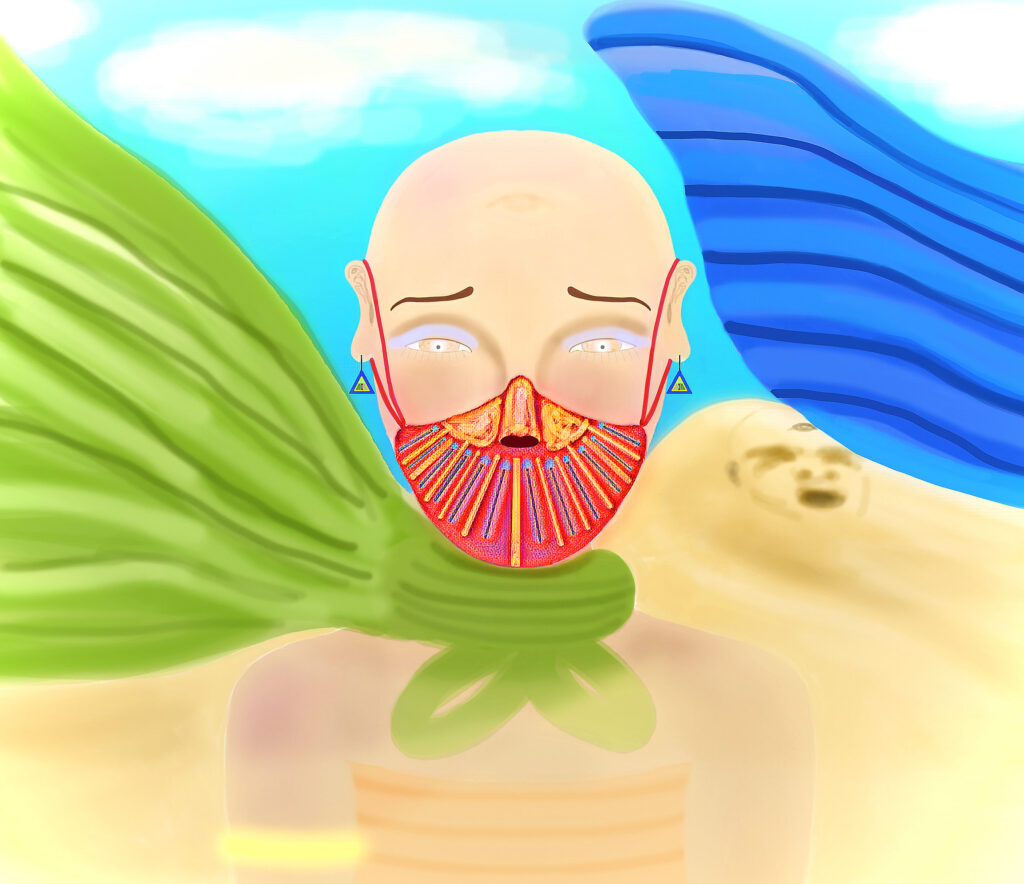

As the sun reached directly over our heads, the last storms finally fizzled out with a putz. Now, the land was clear in all directions with pale sand hills stretching as far as our eyes could see.
“Well,” Nagí Dey said, taking off their mask. “The last time the Bandit’s Map was in my hand, the caravan was nearby.”
“The last time? And where is Bandit’s Map now?” Nagí Ūsím said. Nagí Dey grinned as they pointed to the crystal blue horizon behind them.
“That way!”
“Oh, honey,” Nagí Ūsím replied, placing their hands on their waist as they looked to the sky shaking their head. “That will make finding the caravan a little difficult, now, wouldn’t it?”
“A little, yes, but I wouldn’t worry. The last time I took a peek, we were getting very close, so a little hope there. If I were a betting Nagí – and I’m not – but if I were, I’d say it’s about a city’s walk over one of these larger hills.”
“Do you know which one?
“There’s a large hill almost everywhere!” Imjí Standing Fish said twirling and pointing in all directions. “Over there. Over there. Over there. Over there.” She stopped to regain her balance, then resumed her twirl, her arm beginning rigid straight, then flopping more and more with each completed circle “And there. And there. And there. And there. And there. An–“
“That’s not helpful,” Nagí Ūsím said. “You’re going to get sick.”
“What? I’m just saying!” Imjí Standing Fish replied, wobbling sideways towards them before finding her balance again. Folding her arms, she puffed out her face. “Hey, at least, I didn’t lose the map,” directing her head towards Nagí Dey.
“Me?! Hah! I didn’t lose it, it just left!” Nagí Dey replied with a chuckle. “Uh oh,” they said, clutching their stomach as it began rumble.
“Was that thunder?” Imjí Standing Fish asked with a snicker. Her expression weakened as her own stomach began to groan. I watched as Nagí Ūsím clutched, then I clutched mine. Now, all our stomachs were making guttural rumbles.
“Oof,” Imjí Standing Fish moaned.
“You know, I’m not a betting Nagí – but if I were, I’d say that our stomachs grumbling together is a sign,” Nagí Dey replied, smirking.
“Maybe we should take a little rest, now that the storms have passed,” Nagí Ūsím said.
“Yes, I’ll get the blanket out of my backpack and summon a little cloud for some nice shade. We’ll eat our sandy sandwiches and drink some tea to regrow our energy. With a full belly, we’ll be able to finish the journey to the caravan – wherever it is.”
“Sandy sandwiches?” Imjí Standing Fish said, immediately laying down like a starfish on the blanket as soon as Nagí Dey had rolled it out.
“Go through as many sandstorms as we just did,” Nagí Dey said, curling their lips towards the sky. “And you’re bound to find a little sand everywhere in every pocket and bag.”
“Barnacles…”
Unfolding a thick linen bag with many smaller and thinner linen bags, Nagí Dey displayed the sandwiches across the textile rainbow blanket. Each looked like they were wrapped delicately, forming perfect circles.
“Which sandwich would you like, Imjí?” Nagí Dey asked.
“Anything! Well – just not fish…”
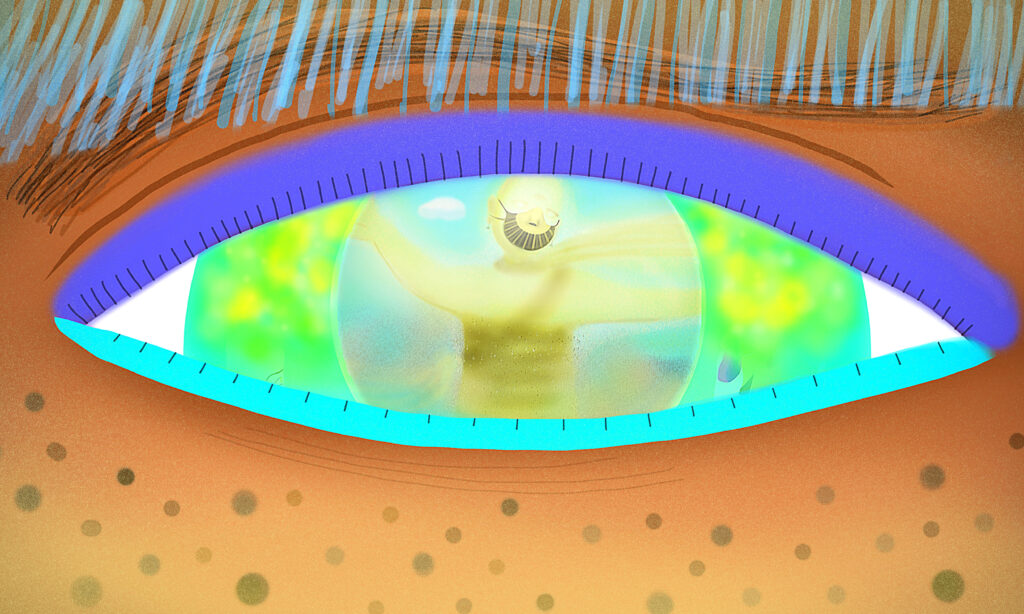

After our sandwiches – none of which were fish – and enchanted teas, our hopes brightened. Imjí Standing Fish told us more about her story and the long hard journey she and her sister, Emja Strong Fin, took to get to New Sūndūn all the way from Imhí River. They had come as kids fleeing a new war. On one level, their journey sounded terrifying, filled with violence and danger. On the other, it sounded like a grand adventure, which probably had to do with the animated way Imjí Standing Fish chose to tell it, moving around the blanket like a Tín Gardūn street performer. When the bad characters came into the story, who were mostly birds called Tolhí, she puffed her face and stomped around the blanket. She even spread her arms and hands with open palms out, mimicking the birds as they flew to try to capture her and her sister.
“When we reached the end of the cave, there they were! A dozen Tolhí gathered around the glowing rock just below us. We tried to be quiet, tip-toeing around, but that only worked for so long. We were almost passed them when the MEANEST looking Tolhí saw us! From the corner of his eye, he spotted me. Me and Emja, we didn’t waste one moment. We ran, ran, RAN! Then…WOOSH! WOOSH! WOOSH! The Tolhí dove at us from the sky! We thought we were worm food! Then…BACHOOO! Out of nowhere, a blue streak blinded the great sky!”
“Sounds like great magic,” Nagí Dey said, grinning, sipping the last of their enchanted lemon tea.
“It was! But it wasn’t a Nagí! No, no, NO! It was…” She paused for effect, drawing a deep breath. “Merimal! And her mountain yana – Vi’gilbrí!”
“Merimal?” I peeped, thinking it was a kind of sorcerer, like a Nagí.
“The Urth Rider,” Nagí Dey replied, beaming in wonder. “The eternal wanderer.”
“It was wand magic,” Imjí Standing Fish continued. “That spell was so bright, ALL of the mean Tolhí flew away! She was the one who helped us get to New Sūndūn and brought us safely to our aunt and uncle. Without her, we’d probably be – CHZZZTT – worm food by now.”
“You were blessed that day,” Nagí Ūsím said, wiping the last of crumbs their tomato sandwich from their beard. Lying back down in a starfish pose next to me, Imjí Standing Fish smiled ear-to-ear.
“I’ll say! That was me and Emja’s first time ever seeing real magic. Ever, ever, ever.”
“And powerful magic,” Nagí Dey added.
“Crazy powerful! Bachoo! Bachoo!”
“Urth magic is different than Nagí magic,” Nagí Dey continued.
“Bachoo! Bachoo! Tzzzz!”
“Nagí work from our hands, that’s why our hands turn out so wrinkled and rough, you see. Urth work from wands and stones. Still powerful but very different in many ways. Urth sorcerers have to spend many years training their wands and stones, you see. They say it’s almost like raising a baby.”
“Yuck! A baby?! I couldn’t raise a baby. Ew! Ew! Ew! Ew! EW!” Both Nagí Dey and Nagí Ūsím laughed as Imjí Standing Fish screwed up her face and flailed her legs about thinking about kids. I, too, wanted to laugh, but I couldn’t. I started to become nervous, thinking about…
“Hey – so, like, all of those spells you did today. The wind spells, the sand spells, the cloud spell, the tea spell, which, by the way, thank you very much…Is that what you’re going to teach Rashíqí?”
“In time,” Nagí Ūsím nodded, looking at me with a smile.
“Holy lightning gills! Rashíqí’s going to be able to do all of that?!” Imjí Standing Fish, seeming to now remember I sat next to her, began tugging on my long skirt and lowering her voice as if no one else would be able to hear. “You’re going to be able to do all of that?” I knew Imjí Standing Fish meant nice. I could feel her aqua blue eyes staring straight into my grey ones, but I pretended I couldn’t tell. I looked away, keeping my eyes on the blanket’s corner, as my cheeks grew hotter.
“When the time is right,” Nagí Ūsím said. “One day, Rashíqí will become as powerful as me.”
“No way!” Imjí Standing Fish exclaimed. At once, Imjí Standing Fish bolted up in wild excitement and began flailing her hands around, striking strong poses, like she was a Nagí in the middle of a great battle and adding all kinds of noises. While Nagí Dey and Nagí Ūsím chuckled, I felt the world starting to cave in again.
“‘No way’ is how I feel,” I said under my breath. I really didn’t mean to speak, and I immediately felt embarrassed when I heard my sad tone as it exited my mouth. I guess, the thought had come out of me, like heartburn. Everyone had heard. They stopped what they were doing, even Imjí. They looked at me with their smiles washed away and raised their eyebrows in disbelief.
“What do you mean?” Nagí Ūsím asked, their emerald eyes piercing my sinking mind.
“I’ll,” I began, choking up. “I’ll … never be … as good as you… Or Dey.”
“Don’t say that,” Nagí Ūsím said, as though I had done something very wrong. Tears began building in my eyes. They looked to Nagí Dey, then back at me. Where Imjí Standing Fish was, I could no longer clearly see. “Of course, you will, Rashíqí. You’re a Nagí. All Nagí begin small – and they all grow to be tall. That is the way of the Nagí, the way of all life’s story.” I couldn’t help but sob. Someone knelt beside me. Their small hand rubbed my back as I buried my head in my hands pouring out memories of the foster family.
“You’re my friend,” Imjí said. “My friends can do anything. Anything, anything, anything!”
“Listen to Imjí,” Nagí Dey said. “You can do incredible things.” As I dried my eyes with end of my shirt, I looked to the Nagí. They were both standing on the patterned blanket facing me. Nagí Ūsím had their arms crossed rigid. Their face had a look of worry, while Nagí Dey smiled flowing their hands gracefully through the air, as if the air held invisible wonder that only they could see. Nagí Dey beamed.
“Our magic is a most wonderous and beautiful thing,” they began. “For a Nagí, all magic begins the same: with the seed – inspiration.” Something in Nagí Ūsím’s face looked unnerved. There was a worry, maybe that we were about to miss the next caravan…or something else. Nagí Dey continued. “See, a Nagí’s spell is only as good as their inspiration – and then their intention. It doesn’t matter how big the Nagí is. You can be a BIG Nagí and have a weak spell, or you can be a small Nagí and have a strong one. See, it’s not the Nagí’s height that determines the spell, it’s their inspiration, which can come from anywhere, anyone, and any thing.” I looked to Nagí Ūsím, expecting them to further explain, but they didn’t say a word. They only smiled but weakly. Nagí Dey turned around and began walking out a handful of paces from the blanket.
“Uh, hello, we still have to clean up. Where do you think you’re going?” Imjí called after them.
“To show you the power of inspiration! You’ll want to put your masks on!” No sooner did we pull our straps over our ears, did the sand begin to hum. It started in a low rumble and then increased in pitch. Suddenly, singing sand from everywhere began to pull into the air above Nagí Dey. They didn’t hurt, and there were no teeth. In fact, the grains almost tickled, streaking past our faces. Under the sun, the sand shimmered in a faint yellow cloud, twinkling like afternoon ocean water. “This is the fun part!” Nagí Dey called over their shoulder. In a sweeping gesture of their arms, the yellow cloud shot up to the sky, burst like a firework, and fell back again, coalescing into a familiar shape. It was a person. It was a child. It was a Nagí. It was – me. When Imjí realized it too, she gasped, then cheered.
“Holy lightning gills, it’s you, Rashíqí! It’s you, it’s you, it’s YOU!”
“How’s it going up there?” Nagí Dey called to up my likeness in the sand. I watched spellbound as she jubilantly threw up her arms, twirling three times before coming to rest with her arms by her sides.
“Hey there, sand friend! By chance – do you see a caravan?!” Imjí yelled.
“Oh, yes. We’re looking for a caravan. Do you see it over any of the hills?” Nagí Dey called. Scanning the land, the sand me lit up and pointed to the hills just behind her. “Is it far?”
She shook her head.
“So, just over there?” Nagí Dey asked. The sand me nodded. “Excellent!” Just as I was about to ask her my question, she waved goodbye before returning back to the land.
“Hah. I guess there’s the answer to our question, Ūsím. The caravan is less than a city’s walk away. It’s just over there.” Nagí Ūsím only nodded.
“Hey, Nagí Dey,” Imjí asked. “How come you didn’t use that spell – oh, I don’t know – before?” Finally, Nagí Ūsím broke their silence.
“They needed the inspiration.”
“Exactly,” Nagí Dey replied nodding their head.
“So, wait, are you saying you weren’t inspired before?” Imjí continued, scratching her coral blue head of hair.
“Oh, I was inspired, sure. The desert is inspiring, the golden sand, the ocean blue sky – at least, when it’s not all angry trying to kill you, heh-heh-heh. But, no, it was Rashíqí who inspired me this time.” Beaming, Nagí Dey continued. “That’s why the sand took her form. See, it could have been anyone. It could have been me. It could have been Ūsím, but all I could think about was her power. It had to be you. It had to be you, Rashíqí the Great”
In that moment, as Nagí Dey’s eyes connected with mine, I saw a vision, quick as lightning. It flashed in and flashed out, then flashed back in again. When I closed my eyes, I saw it clear as day, and, for a moment, I lived in it. From where I stood in the vision, there was no sand anywhere. There was no ocean, either. Instead, there was grass, lots of it, and a couple super green trees nearby under a sun and twinkling violet night sky. In the center, I could see myself sitting on a storm cloud, but it wasn’t exactly myself. She looked like me, but she also looked like someone else, an older Nagí, wearing my clothes. Was this the older me? Ocean light surrounded her and under her cloud emerged rainbow colored lightning, but it wasn’t normal lightning. The single lightning became many little lightnings, dancing happily together below the Nagí. I wanted to know – was she me? I opened my mouth to say hello, but just as I did, the vision disappeared, taking with it the Nagí, the lightning, the hills, the trees – everything.
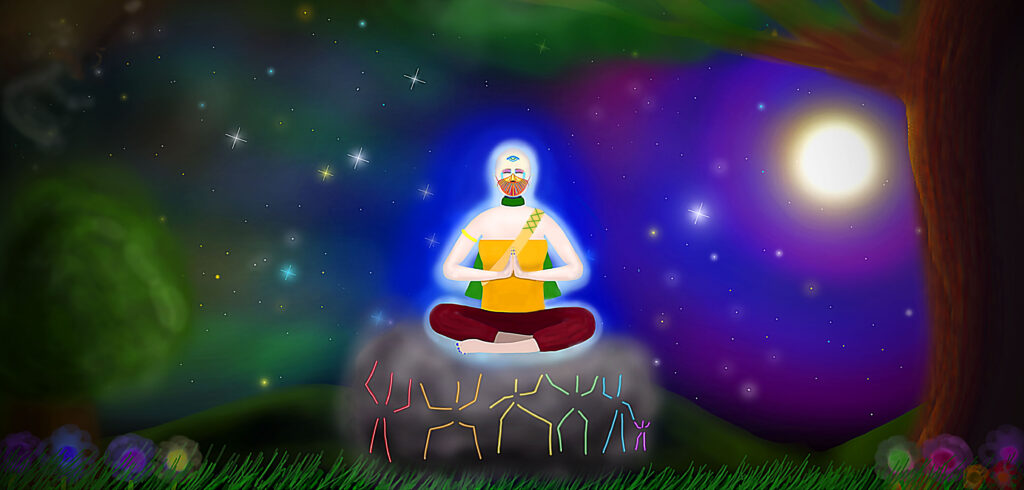

Suddenly, I was in the desert again. My legs and arms felt weak, and I realized I was being carried. Opening my eyes just a little, I could see the sun had moved considerably. Now the sky, which had been bright blue, had evolved into a deep blue orange goldening. I shut them again and pretended to be asleep.
“But do you think she’s going to be okay?” I heard Imjí say somewhere below me and to my left.
“I hope, young Imjí,” Nagí Ūsím replied, bolstering their grip.
“Rashíqí is going to be just fine,” Nagí Dey said, chuckling from somewhere just ahead. “See, it’s quite normal for young Nagí to faint. But I admit, maybe the sand charm was a tiny, weeny extra. A little too much all at once.”
“But after all the spells you two made fighting the storms?”
“That’s a bit different. The magic we used fighting the storms off was magic of self-defense. The magic Dey used to enchant the sands after lunch was magic intended to reach Rashíqí’s third eye,” Nagí Ūsím answered
“A little rain to grow the seed,” Nagí Dey said.
“Huh?”
“The third eye is where a Nagí’s magic comes from. The third eyes of young Nagí are more delicate to begin with. Too much magic directed at them, even magic made with the best intentions, always runs the risk of causing a young Nagí to faint. That’s why it’s best to teach the Nagí Way, slowly.”
“Meh. Slow or fast, she was going to faint anyway,” Nagí Dey said. “They all do. I just thought it would be a good thing for her to see the truth.”
“But she fainted,” Imjí said.
“She grew.”
“Is that what I think it is…?”
“The caravan!”
“Yipee! Yipee!”
“We’re almost there.”
“But do you really think one day she’ll be as powerful as you?” Imjí said, excited in her voice. As the noise of the caravan drew closer, the two Nagí grew quiet, then Nagí Ūsím stopped moving all together. We must have been on top of a hill. I slowly opened my eyes and saw the sun, an orange blob, melting into the sands. The sky’s first stars were starting to appear.
“It might take time, but if she takes the Nagí Way seriously,” Nagí Ūsím said, “there’s no reason why she won’t be as powerful as us.” Somewhere standing right next to us was Nagí Dey. I closed my eyes and imagined their smile illuminating the land. For a brief moment, I could see the vision again. I could feel the last of the rain soak into my seed, into my skin. I was a desert away from the foster home, on the other side of the storm.
“I have no doubt in my mind,” Nagí Dey said. “She won’t just be good.”
“She won’t?”
“She’ll be great.”
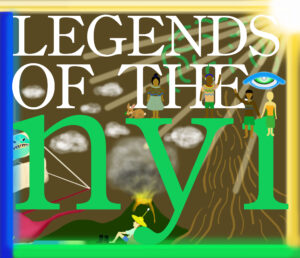

©2021 LEGENDS OF THE NYÍ ALL RIGHTS RESERVED